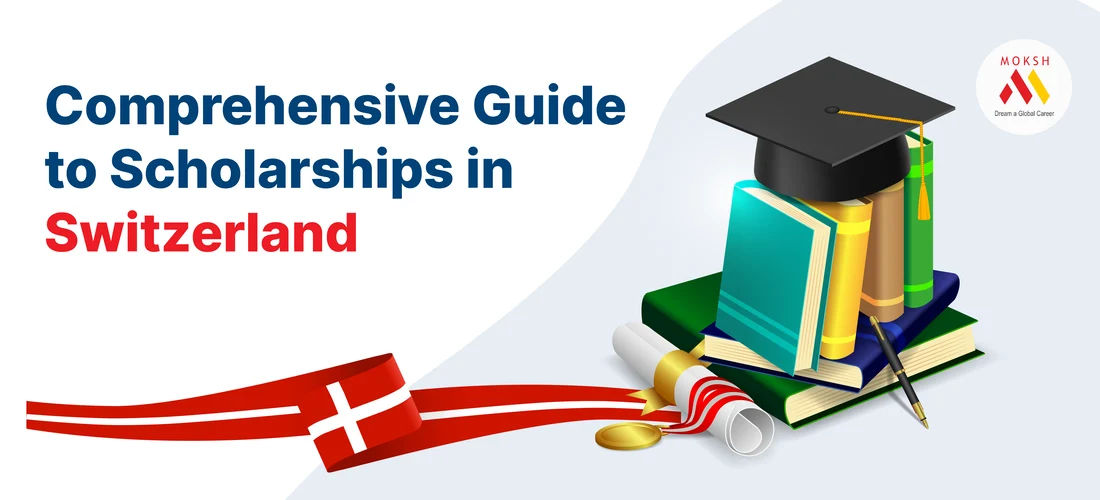
Switzerland, a land of towering peaks and world-class universities, beckons international students seeking an exceptional Bachelor's, Master's, or PhD education. However, tuition fees can pose a significant challenge. Its comprehensive guide empowers you to navigate the landscape of scholarships in Switzerland. We'll unveil a range of funding options offered by the Swiss government, prestigious universities, and generous private organisations. Discover the eligibility requirements, application processes, and the valuable financial support these scholarships provide for undergraduate and postgraduate studies. They are turning your dream of studying abroad in Switzerland into reality with this essential resource.
Types of Scholarship in Switzerland
Switzerland boasts a decadent scholarship landscape catering to many student profiles. Here's a breakdown of the most common types:
- Government Scholarships: The Swiss Confederation's prestigious awards promote international exchange and research cooperation. Examples include the Swiss Government Excellence Scholarships for Foreign Students and the Federal Commission for Scholarships for Foreign Students (FCS) awards.
- University Scholarships: Many Swiss universities offer scholarships for outstanding international students. These scholarships can be merit-based, need-based, or subject-specific. Examples include the ETH Zurich Excellence Masters Scholarships and the University of Lausanne Master's Grants for Foreign Students.
- Private Scholarships: Numerous foundations, organizations, and individuals provide scholarships for international students in Switzerland. Various criteria, such as academic achievement, financial need, or nationality, may be used to award scholarships. Some examples include the Friedrich Naumann Foundation Scholarship for International Students and the Nestle MBA Scholarships for Women from Developing Countries.
- Need-Based Scholarships: These scholarships prioritize students who demonstrate significant financial need. They can help bridge the gap between tuition fees and your available resources.
- Merit-Based Scholarships: This award is given to students with exceptional academic performance, standardised test scores, or a strong portfolio in arts programs.
- Subject-Specific Scholarships: These scholarships cater to students pursuing specific areas of expertise that require specialized knowledge and skills. These include fields such as engineering, medicine, and environmental science. Industry organisations or professional associations often fund them.
Eligibility Criteria for Swiss Scholarships:
Meeting eligibility criteria is crucial for a successful scholarship application. Before applying, it is important to check the specific requirements for each scholarship.

- Academic Requirements: Most scholarships require a strong academic record, which is reflected in your GPA, standardised test scores (if applicable), and transcripts.
- Nationality Requirements: Some scholarships are open to students from all nationalities, while others are restricted to specific countries or regions.
- Language Requirements: English, German, or French proficiency tests (TOEFL, IELTS, DELF, etc.) might be mandatory depending on the scholarship and the language of instruction at the university.
- Work Experience Requirements: A few scholarships, particularly for postgraduate studies, may require relevant work experience in your field.
- Research Experience Requirements (for PhD scholarships): Demonstrating prior research experience or a strong research proposal can significantly strengthen your application for PhD scholarships.
The Application Process for Swiss Scholarships:
Preparation is vital for a successful application. Here's a breakdown of the typical process:

- Deadlines and Important Dates: Pay close attention to application deadlines. You must complete these deadlines to ensure you are considered.
- Required Application Materials: These usually include transcripts, letters of recommendation, a statement of purpose essay, a CV/resume, and language proficiency test scores (if applicable).
- Application Platforms: Applications might be submitted through online portals, university websites, or directly to the scholarship provider.
- Selection Process and Timeline: The selection process can vary but generally involves reviewing application materials and, in some cases, interviews. Allow sufficient time for communication from the scholarship provider.
Benefits of Scholarships in Switzerland:
Scholarships go beyond just tuition fee coverage. Here's a glimpse of the potential benefits:

- Tuition Fee Coverage (full or partial): Scholarships can significantly reduce or even eliminate your tuition fees, making studying in Switzerland more affordable.
- Living Expenses Stipend: Some scholarships provide a stipend to help cover living expenses such as accommodation, food, and transportation.
- Travel Allowances: Financial assistance for travel costs to and from Switzerland can be included.
- Health Insurance Coverage: Certain scholarships might offer health insurance coverage, ensuring you have access to essential healthcare services during your studies.
- Research Funding (for PhD scholarships): PhD scholarships provide funding for research expenses, materials, and travel related to your dissertation.
- Networking Opportunities: Scholarship programs can connect you with a network of other scholars, mentors, and professionals in your field, opening doors for future collaborations and career opportunities.
- Links to official scholarship websites: Swiss government websites, university scholarship pages, and foundation scholarship portals will provide detailed information and application instructions.
- Tips for writing a strong scholarship application essay: A well-crafted essay showcasing your academic achievements, research goals, and motivations for studying in Switzerland can significantly impact you. Research writing resources and seek guidance from advisors or writing centres at your current institution.
- Information on student visas and permits for studying in Switzerland: Ensure you understand the visa application process and requirements well before your studies.
Conclusion:
Switzerland beckons with its world-renowned universities and breathtaking landscapes. Don't let financial constraints hold you back! This comprehensive guide has equipped you with the knowledge to navigate Switzerland's exciting world of scholarships. Explore diverse scholarship options, prepare your application materials meticulously, and confidently pursue your academic dreams. Remember, with dedication and the right resources, your journey to studying in Switzerland can become a reality.



.png)



.png)
.png)
